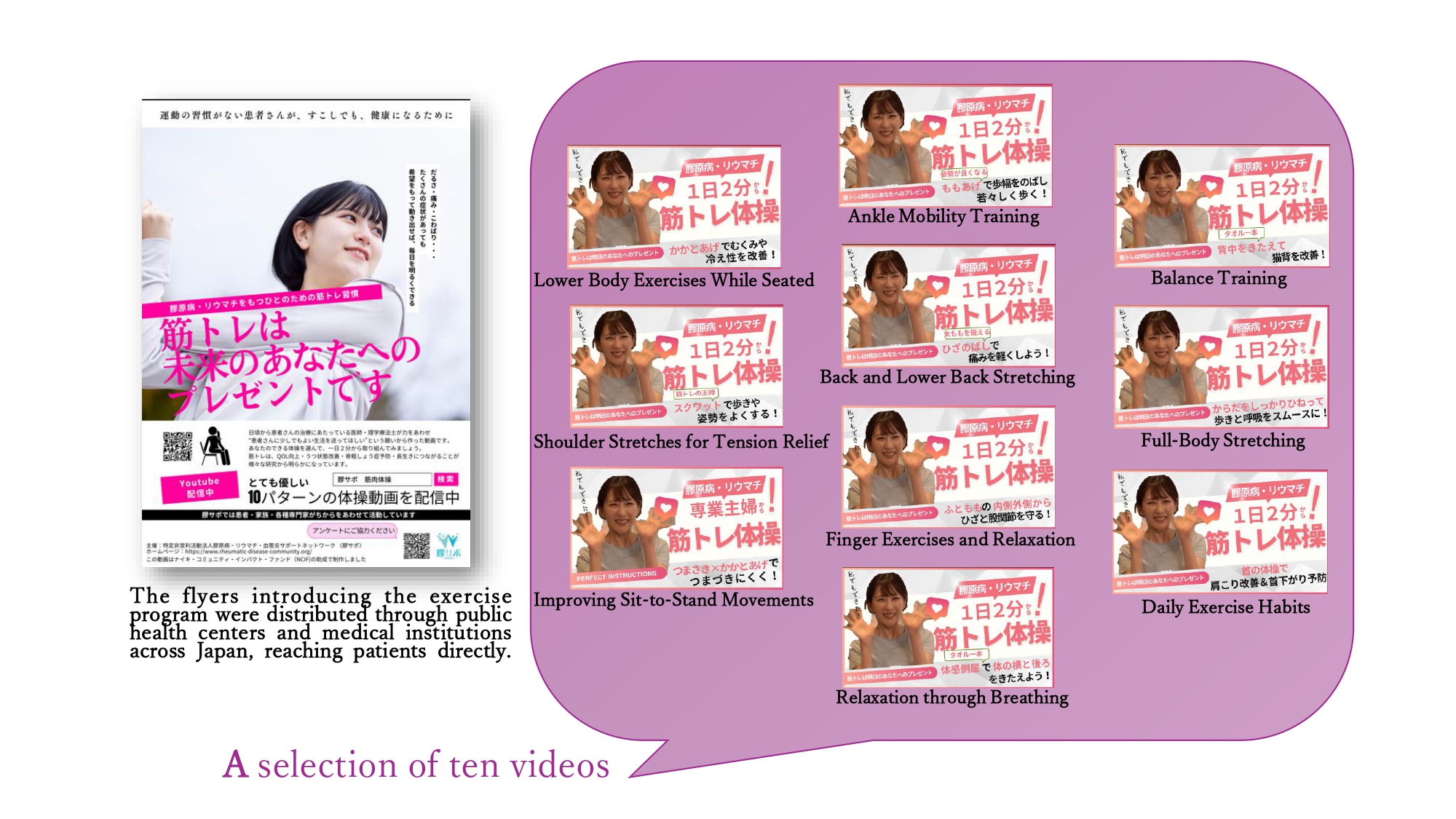Session Information
Session Type: Poster Session A
Session Time: 10:30AM-12:30PM
Background/Purpose: Rheumatic and musculoskeletal diseases (RMDs) cause chronic pain, joint deformities, and reduced mobility, significantly limiting patients’ daily activities and social participation. Physical inactivity can also lead to secondary risks such as cardiovascular disease and depression, worsening quality of life (QOL). EULAR(2021) recommends exercise as an effective non-pharmacological therapy, which can reduce pain and fatigue and improve mental health. However, many Japanese patients express uncertainty about how to exercise and fear worsening symptoms. The spread of online exercise support remains limited, contributing to an information gap. In response, a patient-led project was launched to create and distribute exercise videos accessible to all, involving patients, families, and healthcare professionals.
Intervention: The project consisted of three steps. In Step 1, an on-demand seminar was held in May 2024 to coincide with World Lupus Day, gathering insights on patients’ interests, concerns, and challenges related to exercise. In Step 2, a multidisciplinary team—including doctors, physical therapists, nurses, psychologists, and patient representatives—was formed to develop ten exercise videos based on these insights. In Step 3, the videos were released on the patient group’s website and social media (X and Instagram), with flyers distributed at medical institutions and academic conferences.
Maintenance: All ten videos are designed to be easy to follow and sustainable, minimizing joint strain. The video titles and content are:
Lower Body Exercises While Seated: Safe movements to strengthen thighs and calves.
Shoulder Stretches for Tension Relief: Simple stretches for stiff shoulders and neck.
Improving Sit-to-Stand Movements: Exercises to assist rising from a chair.
Ankle Mobility Training: Movements to increase flexibility and prevent falls.
Back and Lower Back Stretching: Exercises to loosen tension from prolonged sitting.
Finger Exercises and Relaxation: Improve hand flexibility and reduce stiffness.
Relaxation through Breathing: Deep breathing to regulate the autonomic nervous system.
Balance Training: Exercises to improve balance and core stability.
Full-Body Stretching: Warm-up and cool-down stretches for the whole body.
Daily Exercise Habits: Tips to maintain and incorporate exercise into daily life.
Quality of Life: The flyers introducing the exercise program were distributed through public health centers and medical institutions across Japan, reaching patients directly. Additionally, some patients accessed the exercise videos via the internet, using websites and social media platforms such as X and Instagram. When the program was introduced to patients shortly after discharge from the hospital, it received positive feedback, including comments such as “This is the perfect exercise for me right now.” These responses suggest that the program provides a feasible way for patients with illnesses to continue exercising without overexertion. It not only supports the maintenance and recovery of physical function, but also helps foster a sense of self-efficacy and optimism, thereby potentially contributing to improved mental well-being.
Takeaway: By regularly promoting the videos through social media and the website, and incorporating them as references during rehabilitation, patients are likely to feel more familiar and comfortable with the exercises.
 Ten videos and flyers that reached our patients.
Ten videos and flyers that reached our patients.
To cite this abstract in AMA style:
Okochi N, Oishi E, Hitoe Y, Koshi H, Kono H. Co-Creation of Exercise Videos by Patients and Professionals to Support Patient Empowerment [abstract]. Arthritis Rheumatol. 2025; 77 (suppl 9). https://acrabstracts.org/abstract/co-creation-of-exercise-videos-by-patients-and-professionals-to-support-patient-empowerment/. Accessed .« Back to ACR Convergence 2025
ACR Meeting Abstracts - https://acrabstracts.org/abstract/co-creation-of-exercise-videos-by-patients-and-professionals-to-support-patient-empowerment/
